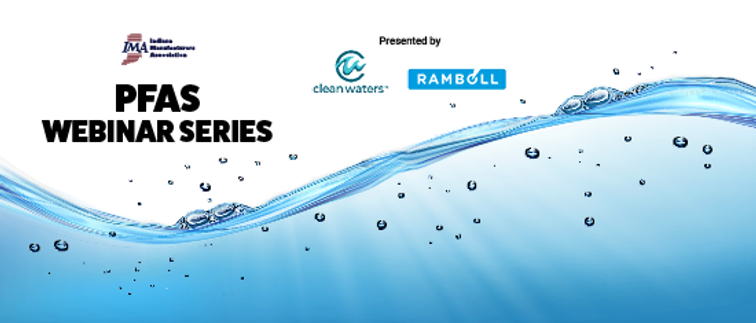Presented by:


About the webinar series
Per- and polyfluoroalkyl substances (PFAS) are a group of compounds classified as emerging contaminants that are resistant to heat, oil, stains, grease, and water. Due to these physical attributes, PFAS have historically been used in a wide variety of manufacturing processes and consumer products since the 1950s. Due to the widespread use of PFAS, many manufacturers may purposefully, or unintentionally, be using products or materials in their processes that contain PFAS (e.g., recycled materials or raw/intermediate products or materials) or have properties impacted by PFAS from training with or use of aqueous film-forming firefighting foams (AFFF)
These compounds can during manufacturing and/or use migrate into soil, water, and air as environmental contaminants. Scientific study and regulations regarding PFAS have been a major focus in recent years including in April 2024 when the United States Environmental Protection Agency (USEPA) finalized the National Primary Drinking Water Regulation (NPDWR) for six PFAS establishing enforceable maximum contaminant levels (MCLs) for these compounds. The USEPA also finalized designation of two common PFAS (PFOA and PFOS) as hazardous substances under Comprehensive Environmental Response, Compensation, and Liability Act (CERCLA). Additionally, PFAS regulatory reporting requirements continue to evolve including recently finalized, or updated, rules for Toxic Release Inventory (TRI) and Toxic Substances Control Act (TSCA) Section 8(a)7.
Ramboll and Clean Waters LLC have organized a three-part webinar series designed to inform Indiana manufacturers on current and upcoming PFAS regulations, regulatory reporting requirements, treatment of PFAS impacted industrial wastewater, and how to be prepared to manage PFAS compliance challenges and reporting requirements. Please join us for this webinar series and interact with our speakers in a live Q&A event following each presentation.
Clarifying Your Role in TSCA 8(a)7
10/9/2024 | 10 a.m. | Webinar
About the event
Part 3 of this 3-part PFAS webinar series will cover manufacturers preparedness to manage PFAS compliance challenges and reporting requirements. Globally, regulations are quickly evolving to include proposed or enacted bans on the use of PFAS in commerce or products. Similarly, state and federal regulations are increasing to respond to and prevent PFAS contamination in the environment. Notably in September 2023, EPA set a timetable for US manufacturers or importers of manufactured goods to begin reporting on PFAS content in their products (i.e., TSCA 8[a]7). With few exemptions, manufacturers must begin reporting current and historical results regarding the presence of PFAS in their supply chains between November 2024 and May 2025.
With as many as 12,000 or more compounds considered as PFAS, these substances can enter a manufacturer’s supply chain through both known and unknown pathways in raw materials, components, manufacturing equipment, surface treatments and services maintenance contracts, to name a few.
Recognizing the scale of the TSCA 8(a)7 compliance task and other existing and anticipated global regulations, is your business prepared to manage this and future compliance challenges? Are you ready for TSCA 8(a)7?
Details
Date: 10/9/2024
Program: 10 a.m.
Registration is free to IMA members!
Speaker
Dr. Lisa Navarro provides strategic scientific support to drive solutions for her client’s most challenging product safety and regulatory compliance needs. Leveraging industrial experience she advises clients on services including GRAS Notifications and Determinations, Cell Culture Consultations, cGMP Reviews, Due Diligence Support, New Dietary Ingredient Notifications, Cosmetic Formulation Safety Reviews, Dietary Intake Assessments, and Food Contact Substance Notifications. Her clients include a broad range of manufacturers, including cosmetics, consumer and household products, food and flavor ingredients, alcoholic beverages, and dietary supplements.
Lisa received her doctorate in toxicology from Florida A&M University. She grew up in South Florida and currently resides in South Ohio. She is also a member of the American Board of Toxicology.


